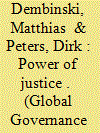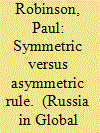|
|
|
Sort Order |
|
|
|
Items / Page
|
|
|
|
|
|
|
| Srl | Item |
| 1 |
ID:
088624


|
|
|
|
|
| Publication |
2009.
|
| Summary/Abstract |
THE 60TH ANNIVERSARY of the Universal Declaration of Human Rights has supplied us with a good pretext to turn once more to the double standards in the international domain of human rights, something from which the world community has so far failed to extricate itself. Not infrequently the problem is described as excessively political. In this context the terms are of secondary importance: what is really important is the fact that the human rights issue is used for political rather than humanitarian purposes.
Double standards are present in domestic policies; not infrequently the media are guilty of it. The same fully applies to national and international NGOs and interstate relations. Put in a nutshell the double standards can be described as politically biased approach to the human rights issue in specific conditions.
|
|
|
|
|
|
|
|
|
|
|
|
|
|
|
|
| 2 |
ID:
153465


|
|
|
|
|
| Summary/Abstract |
THE YEAR 2016 showed ever more graphically and forcefully the depth of the value crisis of the Western political system led by the United States and its allies, regional and European. The remaining community of non-Western states increasingly distrust and even reject the West-imposed "gifts" of neoliberalism, which, according to prominent U.S. philosopher Noam Chomsky, has changed since Adam Smith's days only in terms of the scope of its expansion. Previously, these "gifts" were touted by traders and industrialists who used state power to serve their interests despite the painful consequences for others, including the British people ("others" are colonies, mandated territories and so on); now the goals are more wide-ranging and ambitious: entire countries and regions of the world, as well as the entire world itself.
|
|
|
|
|
|
|
|
|
|
|
|
|
|
|
|
| 3 |
ID:
165909


|
|
|
|
|
| Summary/Abstract |
Complaints about “double standards” in global governance are widespread. When governments from the Global South criticize powerful Western states for applying double standards in implementing norms such as international criminal justice, this is usually taken to indicate that they disagree with the substance of these norms. In contrast, this article argues that the criticism can also be understood as expressing dissatisfaction with the procedures for applying those norms. Based on insights from empirical justice research in social psychology, the article highlights the significance of procedural fairness for the legitimacy of institutions and illustrates the importance of concerns about procedural unfairness in recent complaints about the International Criminal Court (ICC) by African governments.
|
|
|
|
|
|
|
|
|
|
|
|
|
|
|
|
| 4 |
ID:
167771


|
|
|
|
|
| Summary/Abstract |
This article proposes that although both Russia and the West claim to support an international order founded on a mutually agreed set of rules, their views of that order are very different. For Russia it is a system in which the same set of rules applies to everybody, and which might therefore be termed “symmetric.” For the West, it is a system in which those deemed “just” have more rights than those deemed “unjust,” and which might therefore be termed “asymmetric.” Through an analysis of recent trends in just war theory, the article will show that the asymmetric Western view of the international order is a natural outcome not only of the West’s relative power but also of human rights doctrines. The supremacy of these doctrines is not, however, fully accepted by Russia. Overcoming Western-Russian tensions requires, among other things, that the two sides find a mutually acceptable view of the international order. The logic outlined in this article demonstrates, however, that this will be difficult to achieve
|
|
|
|
|
|
|
|
|
|
|
|
|
|
|
|
| 5 |
ID:
189187


|
|
|
|
|
| Summary/Abstract |
THE HISTORY of the US is among the shortest and most paradoxical of national histories, a combination of opposites: progressive slogans about democracy and human rights, on the one hand, and on the other - suppression of and reprisals against those who have had their own ideas about history, freedom, social equality, justice, and democracy. The history of the US is not cloudless: It is dramatic and even tragic at certain periods; in fact, this is very typical of most states. An amazed world watched the birth and development of a state that openly declared its goal to be a democratic society in which the individual would become the main agent of history with inalienable rights and freedoms. This was a revolution intended to open a new path of development to humanity. The Founding Fathers of the young state intended to elaborate constitutional principles and provisions to guarantee democracy and genuine human rights and freedoms.
|
|
|
|
|
|
|
|
|
|
|
|
|
|
|
|
|
|
|
|
|